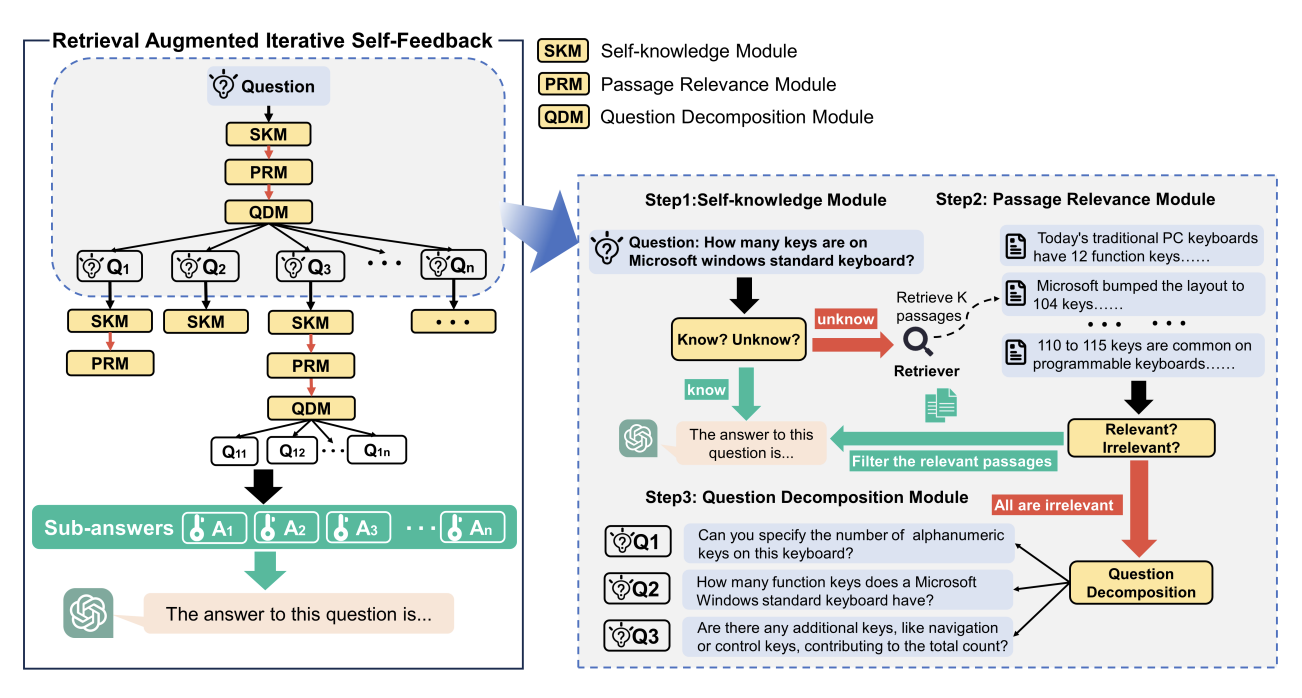This is the official repository of the paper: RA-ISF: Learning to Answer and Understand from Retrieval Augmentation via Iterative Self-Feedback.
Update your environment for the required dependency.
conda create --name raisf python=3.8 -y
conda activate raisf
pip install -r requirement.txtOur approach involves training three sub-modules, each addressing self-awareness, article relevance, and problem decomposition respectively.
We provide a number of data to ask LLMs, using Openai API to generate final result. For incorrect result, we mark as "unknow". For correct one, we mark as "know", the data format are formulated as:
{"question": "{question}", "answer": "know"}
...
{"question": "{question}", "answer": "unknow"}We provide a series of question-passage pairs and prompt the LLM to assess the relevance of the articles. Relevant content is labeled as "relevance," while irrelevant content is labeled as "irrelevance." the data format are formulated as:
{"question": "{question} + {passage}", "answer": "relevance"}
...
{"question": "{question} + {passage}", "answer": "irrelevance"}We provided a series of questions and asked LLMs to generate sub-questions for the corresponding questions. Meanwhile, some datasets have already provided decompositions of sub-questions, and we have incorporated this correspondence into the training data. the data format are formulated as:
{"question": "{question}", "answer": "{"query": ["sub_q1", "sub_q2"]}"}For Llama2 model, we adopt Efficient-Tuning-LLMs repo for training. For more details, refer to source/model/llama2
cd source/model/llama2We train the submodel utilizing the following scripts.
CUDA_VISIBLE_DEVICES=0 torchrun --nproc_per_node=1 train.py \
--model_name_or_path {input_file_path} \
--data_path {data_path} \
--output_dir {output_file_path} \
--num_train_epochs 3 \
--per_device_train_batch_size 4 \
--per_device_eval_batch_size 4 \
--gradient_accumulation_steps 8 \
--evaluation_strategy "no" \
--save_strategy "steps" \
--save_steps 500 \
--save_total_limit 5 \
--learning_rate 2e-5 \
--weight_decay 0. \
--warmup_ratio 0.03 \
--lr_scheduler_type "cosine" \
--logging_steps 1 \
--deepspeed "scripts/ds_config/ds_config_zero3_auto.json"When we utilize Flan-T5 as submodels, leveraging the three datasets we've collected, we train using the following script:
cd source/model/flan-t5
python flan_seq2seq.py --epochs {epochs} \
--dropout {dropout}
--pretrained_ckpt "google/flan-t5-large" \
--peft_method "sft"Remember to change your dataset_id on utils.py
We use Contriever to retrieve documents.
Download the preprocessed passage data and the generated passaged (Contriever-MSMARCO).
mkdir data/retrieval_wiki
cd data/retrieval_wiki
wget https://dl.fbaipublicfiles.com/dpr/wikipedia_split/psgs_w100.tsv.gz
wget https://dl.fbaipublicfiles.com/contriever/embeddings/contriever-msmarco/wikipedia_embeddings.tar
Modify the datapath ,engineand model_path in config.py and contriever_config.py to match your actual paths of the used datasets. Refer to these file for more config details.
python main.py --engine "llama2-13b" \
--base_model_path {base_model_path} \
--self_knowledge_model_path {self_knowledge_model_path} \
--passage_relevance_model_path {passage_relevance_model_path} \
--task_decomposition_model_path {task_decomposition_model_path} \
--data_path {data_path} \
--max_length {max_length} \
--n_docs {Number of documents to retrieve per questions} \
--model_name_or_path {contriever_model_path} \
--passages_embedding "wikipedia_embeddings/*" \python main_gpt.py --engine "gpt-3.5" \
--api_key {your_api_key} \
--self_knowledge_model_path {self_knowledge_model_path} \
--passage_relevance_model_path {passage_relevance_model_path} \
--task_decomposition_model_path {task_decomposition_model_path} \
--data_path {data_path} \
--max_length {max_length} \
--n_docs {Number of documents to retrieve per questions} \
--model_name_or_path {contriever_model_path} \
--passages_embedding "wikipedia_embeddings/*" \Results showed that our method achieved SOTA on four out of five datasets, with an average improvement of +1.9 compared to the best-performing method.
[24/05/17] 🔥 We are happy to announce that RA-ISF has been accepted to ACL Findings 2024!
[24/03/24] 🔥 We have released the version 1.0.1 for gpt-3.5-turbo-instruct base model.
[24/03/21] 🔥 We have released the version 1.0.0 for llama2_13b base model.
If you use this codebase, or RA-ISF inspires your work, we would greatly appreciate it if you could star the repository and cite it using the following BibTeX entry:
@inproceedings{liu-etal-2024-ra,
title = "{RA}-{ISF}: Learning to Answer and Understand from Retrieval Augmentation via Iterative Self-Feedback",
author = "Liu, Yanming and
Peng, Xinyue and
Zhang, Xuhong and
Liu, Weihao and
Yin, Jianwei and
Cao, Jiannan and
Du, Tianyu",
editor = "Ku, Lun-Wei and
Martins, Andre and
Srikumar, Vivek",
booktitle = "Findings of the Association for Computational Linguistics ACL 2024",
month = aug,
year = "2024",
address = "Bangkok, Thailand and virtual meeting",
publisher = "Association for Computational Linguistics",
url = "https://aclanthology.org/2024.findings-acl.281",
pages = "4730--4749",
abstract = "Large language models (LLMs) demonstrate exceptional performance in numerous tasks but still heavily rely on knowledge stored in their parameters. Moreover, updating this knowledge incurs high training costs. Retrieval-augmented generation (RAG) methods address this issue by integrating external knowledge. The model can answer questions it couldn{'}t previously by retrieving knowledge relevant to the query. This approach improves performance in certain scenarios for specific tasks. However, if irrelevant texts are retrieved, it may impair model performance. In this paper, we propose Retrieval Augmented Iterative Self-Feedback (RA-ISF), a framework that iteratively decomposes tasks and processes them in three submodules to enhance the model{'}s problem-solving capabilities. Experiments show that our method outperforms existing benchmarks, performing well on models like GPT3.5, Llama2, significantly enhancing factual reasoning capabilities and reducing hallucinations.",
}



